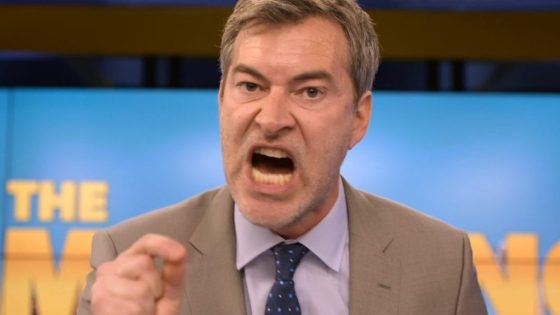“Shouldn’t Chip know better?”
Mark Duplass was uneasy when he learned that Chip Black, his character in “The Morning Show,” was about to embark on a messy, secret workplace affair — with a junior staffer, no less. It’s been a rough few years for Chip, who was demoted as “The Morning Show” to gracefully become Alex’s (Jennifer Aniston) personal producer. In Season 3, Chip’s life further spiraled as he entered a relationship with Alex’s assistant, Isabella (Hannah Leder).
“I was nervous about that storyline. I had the same reaction you did,” Duplass says. Though flawed, Chip is often “The Morning Show’s” voice of reason, and Duplass worried it was out of character to send him down the path of Mitch Kessler (Steve Carell), the former anchor Chip outed for sexual misconduct in Season 1.
But two things soon became clear. First, Chip and Hannah’s relationship was mutual and consensual, lacking the blurred lines and abuse of power surrounding Mitch’s affairs. Second, for Chip, it wasn’t really about Hannah at all.
“The way to understanding how he could make the huge mistake to step into a workplace romance,” Duplass explains, is that “he’s got the best Achilles heel in the world: his obsession, deep love and codependence for Alex Levy. He’s thinking, ‘What is wrong with me? Why can’t I just have a normal romance?’ That’s the front of his brain. And the reptilian part of his brain is like, ‘What if I do it with a person that might have a chance of making Alex Levy jealous?’ Deep down, what he’s looking for is more attention from Alex.”
Chip and Alex’s ups and downs have framed much of “The Morning Show” since its 2021 debut, but no one deigned to say the quiet part out loud until the sixth episode of Season 3, when Hannah rejects Chip’s marriage proposal — if you can even call it that. Chip pops the question with zero forethought or fanfare during an after-work car ride, and as Isabella points out, it’s only “because of her.” The conversation happens directly after the first time Chip picks up on Alex’s sexual tension with Paul (Jon Hamm), the tech billionaire who’s about the buy the network that airs “The Morning Show.”
Duplass says that the “middle school dating politics” of “The Morning Show” love quadrangle are happening on a subconscious level for his character. Despite that Chip’s job as producer requires him to be “the first one aware of all the interpersonal dynamics developing behind the scenes,” when it comes to Alex’s love life, he loses his skills. “It’s really fun for him to be such a fucking idiot, hanging around like a little puppy because he doesn’t want to believe it’s true.”
Chip’s delusions remind Duplass of “the closeted gay males of the 50s, who were like, ‘If I can just marry a decent woman, everything will be fine. I can shut this part of my emotions off completely, and I will join regular society and everything will be fucking fine.’ He’s having his ‘Far From Heaven’ moment. They do have nice chemistry. They would make a nice pair. But until Chip roots out why he’s become so obsessively codependent on Alex, healthy relationships are going to be an impossibility for him.”
That doesn’t seem to be happening anytime soon, though.
News of Alex and Paul’s relationship breaks to the public at the same time as the overturn of Roe v. Wade. While planning a show about the Supreme Court decision, Chip books a guest who takes Alex by surprise, confronting her on-air about how sleeping with the boss calls her credibility as a journalist into question — and Alex fires Chip over it.
Chip says he had no idea the ambush was coming, but Duplass thinks the character had at least an inkling of the woman’s intentions. “It’s petty behavior; he wanted to punish her a little bit,” Duplass says, though he believes Chip excuses his actions to himself by focusing on the journalistic implications of the relationship, rather than his personal feelings of betrayal.
“He wanted to see that the waters that she’s stepping in are a little poisonous, but at the same time, we’ve seen Chip in Season 2 handle the irresponsibility of being with her while she had COVID and he didn’t,” Duplass says. (Chip finally confesses to Alex that he got himself sick just to take care of her as he’s leaving her office after being fired.)
After that falling out, Chip has nothing to lose. Newly unemployed, he works behind the scenes with Bradley (Reese Witherspoon) and Stella (Greta Lee) to take down Paul, who they discover is planning to dissolve the network and sell off all of its assets. In a last-ditch effort to stop the sale, Chip appears on “The Morning Show” as a guest. While being interviewed by Chris (Nicole Beharie) and Yanko (Nestor Carbonell), he begins shouting directly into the camera, f-bombs galore, about who Paul really is.
This is Chip’s second time becoming a whistleblower, but things are different vs. when he leaked Mitch’s misconduct to the New York Times, which benefitted his career even if it was the right thing to do. Here, Duplass says, Chip isn’t being as selfish. His big move is motivated by “a deep sense of shame from how he’s let his obsession with Alex get the best of him, and how he’s ruined his relationship with Isabella, which he arguably shouldn’t have been in in the first place.
“There is a certainly a lovely, ‘Norma Rae,’ ‘I’m going to carry the flag for journalistic integrity’ speech happening there, and I don’t want to take anything away from that,” he adds. “But I think he’s more than happy to self-sacrifice on this one because he’s got a little self-loathing going on. He’s good with [losing his career]. He feels like his behavior is such that he might not deserve to stay anyway.”
All things considered, things start to look up for Chip.
First, Alex finally comes to her senses and realizes Paul’s unethical, anti-journalism practices. In the finale, she struts into the boardroom with a new plan to merge with a rival network, blowing up Paul’s deal.
And second, it doesn’t seem that Chip’s career is completely dead after all. Duplass is confirmed to be returning to “The Morning Show” for Season 4. He hasn’t seen new scripts yet, but has heard a few details from showrunner Charlotte Stoudt about “how Chip is going to make his way back into this world.”
Duplass will enter production later this summer, while also developing and producing several of his own projects that align more with the indie fare he and his brother Jay Duplass have been famous for since the 1990s. “The Morning Show” has never exactly blended in with that resume, which he laughs about now.
“I’ll be totally honest: I was very nervous to take this job,” Duplass admits. “I had convinced myself that I shouldn’t take a long-term acting job where I wasn’t the boss, because I need to have enough free time to go out and make my indie films the way I want to. When you’re part of a show like ‘The Morning Show’ and they say you have to come to work at this time, no matter what, I have to go. I was like, ‘This is not smart!’ And all the people in my company were like, ‘You’re probably right. You should be free.’”
“But then this thing fell in my lap, and I thought, ‘Oh shit, what am I gonna do now? I shouldn’t be doing this, but it’s so seductive for so many reasons,’” he continues. “First of all, let’s just get this out of the way: ego. To be tapped by Reese and Jen and to be acting with Billy [Crudup] — these are heroes of mine.
“Second, the incredible amount of exposure as an actor is very meaningful when I think holistically about my career,” he says. “I think about John Cassavetes, and how he was able to be in these Hollywood movies and not only take the cash he made, but the popularity, and parlay that into his own productions. And that felt really right to me. And I’m not the kind of person who’s ready to leave town. I just went to my daughter’s sixth grade graduation today and cried my face off. This was a job that shot here in L.A. that would allow me the chance to be present with my family.”
But the last piece of his decision to join “The Morning Show” is the same thing that’s drawn such a varied fanbase to the show: the mix of campy dialogue, forbidden romances and devastating political conversations, all packaged with the gloss of a big-budget Apple production.
“I got the script and had a somewhat complicated reaction. What is the show trying to be? Is it the hard-hitting, journalistic, ‘Norma Rae’ show? Is it OK that there’s some bubblegum and fun in it too? Can those two things coexist? I don’t know how to make a show like this — so that got me really excited. To be a part of a machine where I could learn things I don’t really know how to do.”
Source Agencies




